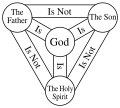Portal:Reformed Christianity
The Reformed Christianity Portal
Reformed Christianity, also called Calvinism, is a major branch of Protestantism that began during the sixteenth-century Protestant Reformation, a schism in the Western Church. In the modern day, it is largely represented by the Continental, Presbyterian, and Congregational traditions, as well as parts of the Anglican and Baptist traditions.
A foundational event that divided the Reformed from the Lutheran tradition occurred in 1529 when reformer Huldrych Zwingli of Zürich broke with Martin Luther on the topic of the Lord's Supper. A separate Reformed tradition developed over several generations, especially in Switzerland, Scotland and the Netherlands.
In the seventeenth century, Jacobus Arminius and the Remonstrants were expelled from the Dutch Reformed Church over disputes regarding predestination and salvation, and from that time Arminians are usually considered to be a distinct tradition from the Reformed. This dispute produced the Canons of Dort, the basis for the "doctrines of grace" or "five points" of Calvinism.
Reformed theology emphasizes the authority of the Bible, the sovereignty of God, and covenant theology, a framework for understanding the Bible based on God's covenants with people. Reformed churches have emphasized simplicity in worship. Several forms of ecclesiastical polity are exercised by Reformed churches, including presbyterian, congregational, and some episcopal. (Full article...)
Selected article
When Mary Tudor ascended the throne and reestablished Roman Catholicism, Knox was forced to resign his position and leave the country. Knox first moved to Geneva and then to Frankfurt. On his return to Scotland, he led the Protestant Reformation in Scotland, in partnership with the Scottish Protestant nobility. Knox helped write the new confession of faith and the ecclesiastical order for the newly created reformed church, the Kirk. He continued to serve as the religious leader of the Protestants throughout Mary's reign. In several interviews with the queen, Knox admonished her for supporting Roman practices. Eventually, when she was imprisoned and James VI enthroned in her stead, he openly attacked her in sermons. He continued to preach until his final days.
Selected images
Did you know...
- ... that the design of the Third Presbyterian Church in Springfield, Ohio, may have been patterned after the Dome of the Rock in Jerusalem?
- ...that Peter Martyr Vermigli's best known work, the Loci Communes, is a compilation of excerpts from his biblical commentaries published after his death?
- ... that Scottish religion in the seventeenth century included intense conflicts between Presbyterian Covenanters and government forces?
Subcategories
Topics
Background: Christianity • St. Augustine • The Reformation • John Calvin • Five Solas • Synod of Dort
Theology: Five Points (TULIP) • Covenant Theology • Regulative principle
Documents: Calvin's Institutes • Confessions of faith • Geneva Bible
Influences: Theodore Beza • John Knox • Jonathan Edwards • Princeton theologians • Henry Cooke
Churches: Reformed • Presbyterian • Congregationalist • Reformed Baptist
Peoples: Afrikaner Calvinists • Huguenots • Pilgrims • Puritans • Scots • Ulster Protestants
WikiProjects
Things to do
 |
Here are some tasks awaiting attention:
|
If those don't satisfy, try wandering through Category:Reformed Christianity articles by quality looking for things to do.
Related portals
Associated Wikimedia
The following Wikimedia Foundation sister projects provide more on this subject:
-
Commons
Free media repository -
Wikibooks
Free textbooks and manuals -
Wikidata
Free knowledge base -
Wikinews
Free-content news -
Wikiquote
Collection of quotations -
Wikisource
Free-content library -
Wikiversity
Free learning tools -
Wiktionary
Dictionary and thesaurus


























